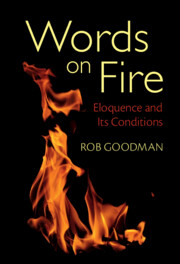Book contents
Conclusion
On Not Listening
from PART II - Eloquence and the Moderns
Published online by Cambridge University Press: 16 December 2021
Summary
The Conclusion demonstrates how the tradition of thinking in terms of rhetorical relationships can illuminate a new problem – in this case, partisan polarization in the United States. The contemporary discourse around polarization casts it as a breakdown in the possibilities of persuasion. For the dominant accounts, the root causes of our polarized politics lie in human psychology and our evolutionary legacy, and to the extent that a solution is possible, it must involve a sweeping program of moral reform. By contrast, an approach grounded in rhetorical relationships would see the polarized citizen as engaged in a deficient, but self-protective, form of listening. Crucially, this listening is the counterpart of the algorithmic and demagogic rhetoric I discussed in the Introduction – deficient, but self-protective, forms of speaking. Just as speakers engaged in those rhetorical pathologies withdraw from the vulnerabilities attendant on speech, polarized citizens withdraw from the vulnerabilities attendant on listening. Just as those pathologies result from an excess of elite risk-aversion, polarized listening is self-defense against the risks and rigors of persuadability. Political “tribalism” is a justifiable response to a broken rhetorical bargain, a refusal to bear the burdens of persuadability under conditions of unmitigated political inequality.
- Type
- Chapter
- Information
- Words on FireEloquence and Its Conditions, pp. 184 - 194Publisher: Cambridge University PressPrint publication year: 2021

